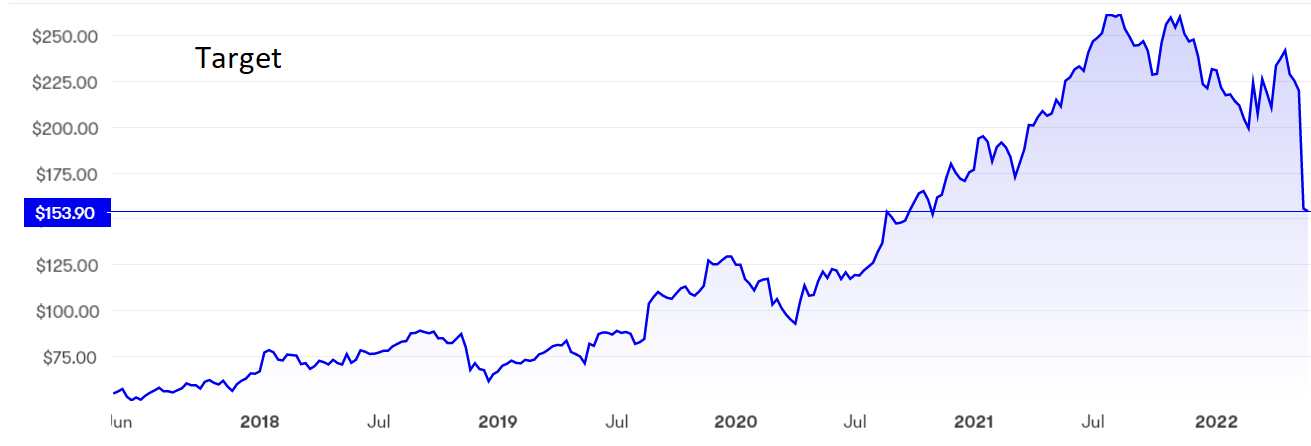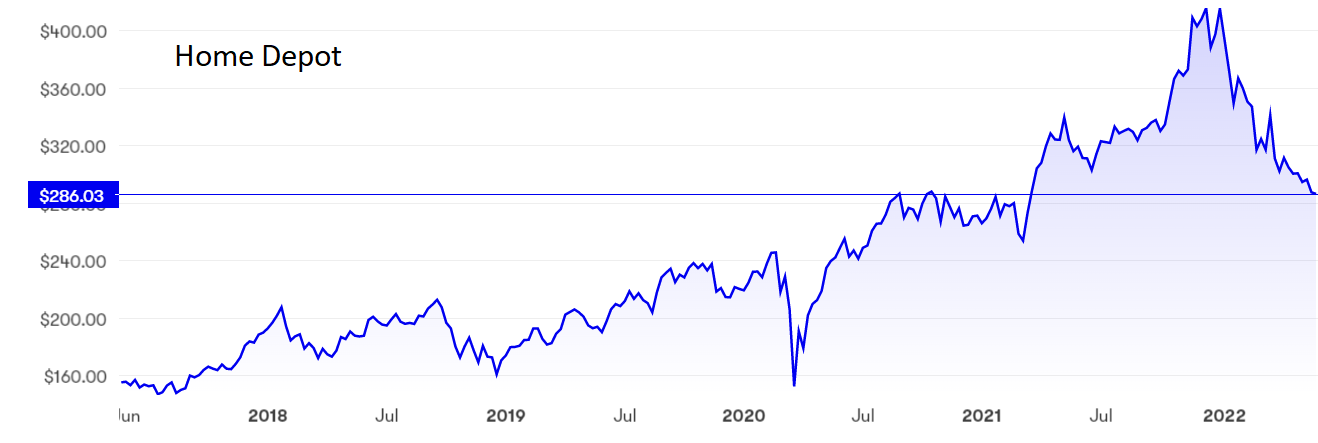These are the three American retail giants I would buy cheaply
25th May 2022 07:59
by Rodney Hobson from interactive investor
Following grim results from some of the world’s largest retailers, our overseas investing expert reveals the bargains he’s spotted in the aftermath.

When the going gets tough, the weak go to the wall and the strong eventually come out stronger. So it is in the American retail sector, where strong brands should ultimately pay off for patient investors.
Two well-known names in the US, Walmart Inc (NYSE:WMT) and Target Corp (NYSE:TGT), produced undeniably disappointing figures for the latest quarter. Even Walmart admitted its performance was unexpected, with pre-tax profits down a whopping 25% to €2.9 billion in the three months to the end of April.
- Invest with ii: Buy US Stocks from UK | Most-traded US Stocks | Cashback Offers
Yet sales were actually 2.4% higher at $141.6 billion. Margins were badly squeezed as inflation, particularly for fuel and food, fed into supply chain costs and the problem was compounded by consumers switching into lower priced items.
- Target and Walmart shock hammers Tesco, Diageo and Unilever
- Is this tech share crash a buying opportunity?
- Snap stock crash has repercussions for US tech and these UK shares
- Want to buy and sell international shares? It’s easy to do. Here’s how
Clearly revenue growth in low single digits is nowhere near enough considering that US inflation hit 8.3% in April and could well move higher. Walmart expects sales growth of 5% in the current quarter, better but still not keeping up with inflation, and it has removed earlier guidance for a rise in profits. Earnings per share are now expected to hold steady but, considering that the February-April quarter fell short of management’s own expectations, there is clearly scope for further disappointment

Source: interactive investor. Past performance is not a guide to future performance.
Smaller rival Target pointed to higher wage and fuel costs plus disruption to the supply chain as it posted profits well below expectations. Target's adjusted earnings per share fell 41% to $2.16, far worse than even the most pessimistic analysts feared.
Target’s management blithely assumed trends during the pandemic would continue as restrictions eased. When consumers switched spending to cheaper products or to services, the retailer was left with merchandise that had to be sold off at cut prices.
The rest of this year is likely to continue to be tough for retailers. Preliminary figures showed retail and food service sales growth slipped from 1.4% in March to 0.9% in April and a further slowdown is expected by analysts. At the same time, supply chain issues, although easing, have not been completely addressed, rampant inflation is always difficult to rein in and the certainty of more interest rate rises by the Federal Reserve Bank will weigh on consumer confidence.
- How Terry Smith is investing as markets crash
- Scottish Mortgage tops up Moderna, trims Amazon and sticks by Netflix
- Warren Buffett: stocks I’m buying and AGM comments
- How high could US interest rates really go?
However, Walmart and Target are strong and solid companies that will withstand the pressure, while weaker rivals will struggle. Target has a particular advantage in that it uses a wide range of city stores to fulfil online orders on the day they are placed.
Furthermore, the bad news has already been factored into their share prices – Target fell 25% when its figures were released and Walmart also suffered, though to a slightly lesser extent. Walmart shares are down from $157 in mid-April to $124 now, where the yield is 1.8%. Target peaked earlier, in July last year, at $260, but most of the drop to $150 has again come since mid-April. The yield is more attractive at 2.34%.

Source: interactive investor. Past performance is not a guide to future performance.
Also under the cosh has been home improvement retailer The Home Depot Inc (NYSE:HD), which produced its best ever first quarter sales at $38.9 billion, up 3.8% on the previous year. Net earnings rose 2.1% to $4.23 billion.
- Chart of the week: how to buy Amazon shares at a massive discount
- Dominic Scriven: the Vietnam trust that beats the S&P 500
- Recessions are becoming more likely – here’s how to invest
Despite facing the same problems as Walmart and Target, Home Depot has raised its sales and earnings guidance for the full year. Even so, the shares have fallen from $415 in December to $287 now, giving a yield of 2.4%.

Source: interactive investor. Past performance is not a guide to future performance.
Hobson’s choice: I tipped Target three years ago at $86.50 and anyone following my advice to buy up to $90 has done very well. The recent fall makes the stock a buy again. I felt cautious about Walmart at $137 after its last update three months ago. Now the shares are lower it is worth considering a buy, but I prefer Target for its higher yield and clearer business model. However, Home Depot looks an even better prospect.
Rodney Hobson is a freelance contributor and not a direct employee of interactive investor.
These articles are provided for information purposes only. Occasionally, an opinion about whether to buy or sell a specific investment may be provided by third parties. The content is not intended to be a personal recommendation to buy or sell any financial instrument or product, or to adopt any investment strategy as it is not provided based on an assessment of your investing knowledge and experience, your financial situation or your investment objectives. The value of your investments, and the income derived from them, may go down as well as up. You may not get back all the money that you invest. The investments referred to in this article may not be suitable for all investors, and if in doubt, an investor should seek advice from a qualified investment adviser.
Full performance can be found on the company or index summary page on the interactive investor website. Simply click on the company's or index name highlighted in the article.
Disclosure
We use a combination of fundamental and technical analysis in forming our view as to the valuation and prospects of an investment. Where relevant we have set out those particular matters we think are important in the above article, but further detail can be found here.
Please note that our article on this investment should not be considered to be a regular publication.
Details of all recommendations issued by ii during the previous 12-month period can be found here.
ii adheres to a strict code of conduct. Contributors may hold shares or have other interests in companies included in these portfolios, which could create a conflict of interests. Contributors intending to write about any financial instruments in which they have an interest are required to disclose such interest to ii and in the article itself. ii will at all times consider whether such interest impairs the objectivity of the recommendation.
In addition, individuals involved in the production of investment articles are subject to a personal account dealing restriction, which prevents them from placing a transaction in the specified instrument(s) for a period before and for five working days after such publication. This is to avoid personal interests conflicting with the interests of the recipients of those investment articles.